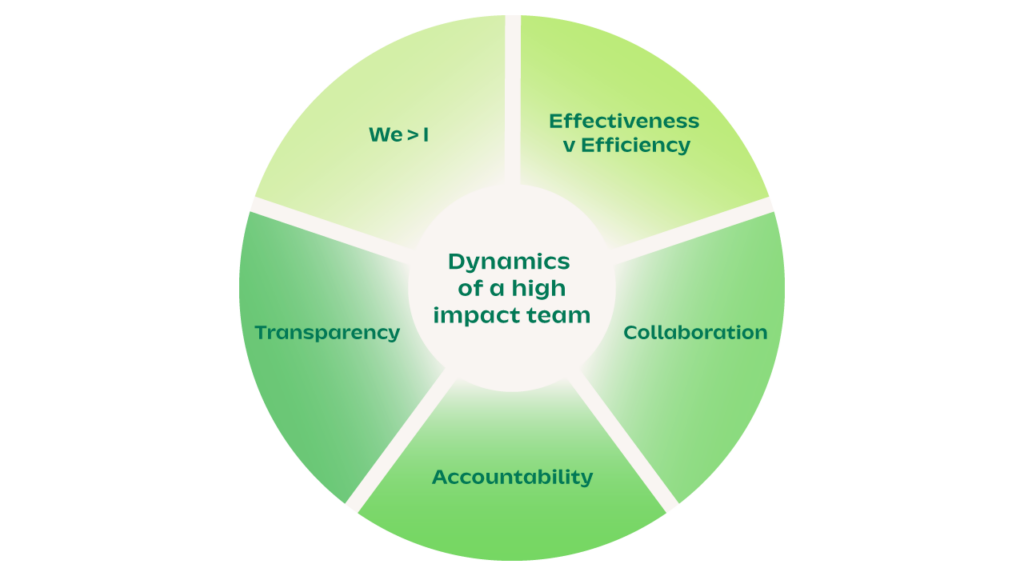
Hiring the right talent is only the first step in building a successful organization. To truly drive results, businesses must cultivate highly effective teams – groups that collaborate seamlessly, confront challenges head-on, and operate with a shared commitment to excellence.
A highly effective team is more than just a collection of skilled individuals. It is a unit that leverages collective strengths, embraces accountability, and continuously strives for greater impact.
There are five key factors to establishing a highly effective team :
– We > I
– Effectiveness
– Collaboration
– Transparency
– Accountability

The Trust
We > I : The foundation of team success
When personal interests take priority over group success, teams suffer. The mindset of “We > I” is essential for a high-functioning, results-driven team. It fosters a collaborative culture where team members support one another and work toward a common goal.
A strong example of this can be seen in elite sports teams. The most successful teams aren’t just those with the best players, but those who prioritize teamwork, strategy, and shared victories over individual recognition.
Beyond efficiency : The pursuit of high effectiveness
Many people equate efficiency with effectiveness, but there’s a crucial difference. Efficiency is about speed and completing tasks quickly, while effectiveness is about achieving the best possible results with minimal resources.
Effective teams don’t just work fast – they work smart. They strike a balance between short-term wins and long-term sustainability, ensuring that every action contributes to the organization’s larger mission. This principle applies cross-functionally, where different teams come together to solve problems and drive innovation.
Leverage strengths : A team’s greatest asset
Every individual brings unique strengths and weaknesses. A highly effective team knows how to leverage the collective strengths of its members, creating a workflow where skills complement one another.
Key practices that enable this include :
- Sharing knowledge and resources to enhance team synergy.
- Encouraging peer-to-peer support, especially during challenging times.
- Recognizing that asking for help is a strength, not a weakness.
Teams that embrace this mindset become more resilient, adaptable, and capable of handling complex challenges.
Confront issues directly : A problem-solving mindset
Avoiding problems only allows them to grow. The most effective teams tackle challenges head-on, acknowledging issues openly and seeking collaborative solutions.
Best practices for addressing issues effectively :
- Speak directly and transparently rather than relying on middlemen.
- Assume positive intent and approach conflicts with an open mind.
- Engage in solution-focused discussions instead of dwelling on blame.
- Encourage open communication to foster a culture of trust and problem-solving.
By confronting challenges directly, teams minimize unnecessary roadblocks and create a work environment driven by continuous improvement.
Dare to take accountability : The mark of true leaders
A team’s success hinges on its members’ willingness to own their responsibilities and take initiative. Highly effective teams cultivate a culture where accountability isn’t feared – it’s embraced.
Key behaviors that drive accountability :
- Taking on additional responsibilities when the situation demands it.
- Admitting mistakes openly and learning from them.
- Encouraging a culture where every team member’s contributions matter.
When accountability is shared, the team as a whole becomes stronger, more reliable, and more capable of achieving ambitious goals.
Final thoughts
Building a highly effective team requires more than just hiring the right people. It demands a culture of trust, collaboration, and shared responsibility. To foster this, organizations must:
Key behaviors that drive accountability:
- Prioritize “We > I” to promote teamwork over individual success.
- Focus on effectiveness, not just efficiency.
- Leverage strengths by supporting and learning from each other.
- Confront challenges directly rather than avoiding difficult conversations.
- Dare to take accountability and own responsibilities with confidence.
When teams embrace these principles, they transform from simply functional groups into high-impact teams that drive success and innovation.